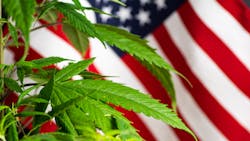Some 66% of Americans now support cannabislegalization, according to Pew and Gallup polling in 2019. That means convincing the holdouts is going to become even harder.
Thisgeneral election on Nov. 3, 2020, five tough states includingMississippi have marijuana law reform on the ballot. Plus, the winners of 35 openSenate seats, as well as the race for President will either advance legalization federally, or thwart it.
Meanwhile, at the state and local level, there’s choices about allowing cannabis stores in towns or banning them; or just decriminalizing cannabis.
Eleven states have legalization, and 33 have medical cannabis, and the results are conclusive. Here’s 9 sharp arguments in favor of cannabis legalization and regulation.
Because cannabis is a medicine

It’s a scientific fact that cannabis fights nausea in chemo patients, and intractable seizures in kids. For anxiety, marijuana is less addictive and toxic than benzodiazepines like lorazepam (ativan). The medical benefits go on and on.
Under federal law, cannabis is considered as dangerous as methamphetamine and heroin. Almost no one thinks that’s true. Humans have been using cannabinoids to feel less pain and inflammation, and feel more relaxation and oneness with the universe, for several thousand years.
We should stop wasting scarce resources
Each year, police make 663,000 pot arrests, costing the US tens of billions of dollars in police time and money that should be better spent testing the rape kit backlog and arresting violent felons.
Just like alcohol prohibition, cannabis prohibitionpays for a massive, violent illicit market. The original goal of marijuana prohibition in the 1930s was to discourage use of it. The opposite happened—in the last 90 years cannabis use exploded in the United States. Virtually any American who wants to obtain cannabis today can find it; they just can’t buy taxed, tested, regulated herb.
We should preserve freedom and increase justice

Everyone has the right to life, liberty, and the pursuit of happiness—as long as they aren’t harming others. It’s a matter of freedom and personal choice for adults to be able to choose weed.
Cannabis prohibition infringes on many rights, including the right to own a gun, and the right to privacy, especially around traffic stops and searches. In legal states like California, marijuana arrests have collapsed from historic highs of more than 100,000 per year to1,181 felony arrests in 2019—the fewest since 1954. And you don’t have to worry about being pulled over and hassled for the mere smell of weed, which cops can fabricate.
Prohibition has become a pretext for arresting decent, law-abiding people
The United States has the largest prison population of any nation in the world, and marijuana prohibition is a major driver of that shameful state of affairs.
In states where cannabis is illegal, any cop can stop and search any person at any time based on a claimed suspicion or smell of marijuana. These pretext “stop-and-frisk” searches became notorious in New York City, but they happen all the time in other jurisdictions as well. The slightest amount of weed, or even an empty pipe, can result in arrest and a life hobbled by the thousands of repercussions that a drug arrest carries.
Black Americans do not use more cannabis per capita than white people, but police arrest Black people 3.73 times as often as whites for cannabis crimes. The war on marijuana has been a war on the poor and people of color from day one. “ It’s an extension of the old Jim Crow laws,” said Nate Bradley, a former cop, and head of the Cannabis Consumer Policy Council.
Legalization creates jobs and raises tax revenue

Legalization raises money. Prohibition burns it. Legal, state-licensed cannabis is already a $10.73 billion industry in the US responsible for243,700 jobs in the US.
In California’s second year of legal sales, 2019, the state collected $305.3 million in cannabis excise tax revenue alone, and an estimated$635 million total in state and local revenue.
Find legal cannabis nearby. Order on Leafly, pickup today
In Colorado, cannabis pays for scholarships for teens instead of causing them to be sent to prison.
Thanks to legal record expungement programs, job seekers face fewer barriers to hiring, and fewer qualified employees face the loss of a job due to their own legal off-the-job use of cannabis.
Legalization increases product safety
Thanks to legalization, there’s now cannabis that a) you do not have to smoke (liketopicals), and b) that does not get you ‘high’ (ieCBD).
In a legal state, homemade mystery brownies are replaced by edibles that are precisely dosed and regulated for food safety. Adults can regulate their THC intake responsibly.
Prohibition doesn’t make cannabis use go away. Instead, it drives all facets of the industry underground, making cultivation, production, distribution, and possession more expensive and dangerous. During alcohol prohibition, ‘bathtub gin’ killed tens of thousands of Americans. In 2019, adulterated THC vape cartridges in the illicit market killed nearly 100 Americans and sickened thousands.
Regulating cannabis like alcohol takes the chaos out of production and distribution. Licensed and regulated companies replace violent drug cartels and street gangs. Consumers get safe, tested cannabis products, instead of pesticide and mold-contaminated products.
Marijuana is less harmful than alcohol
Research has found that moderate, adult cannabis use is less harmful in the short, medium, and long-term than other legal substances.
The CDC found 35,823 alcohol-induced deaths in the US in 2017. By contrast, the CDC did not report a single cannabis-induced death. Alcohol carries 114 times the mortality risk of cannabis. The most potent cannabis concentrate will never kill you, just make you go to sleep. By contrast, a handle of Jack Daniels from the corner store can kill a teen in a couple hours.
Cannabis use does not cause violence or reckless behavior, like alcohol. Cannabis use is also associated with lower BMI and lower rates of diabetes.
Alcohol carries 114 times the mortality risk of cannabis.
The journal Scientific Reports, 2015
Unlike alcohol or tobacco, cannabis use is not independently associated with increased cancer risk. By contrast, tobacco is associated with 30% of all cancer deaths in the US and 87% of lung cancer deaths.
No drug is right for everybody, and adults with contra-indications for cannabis use—like a family history of schizophrenia—should avoid it. Legalization generates funding for health messaging and treatment.
Legalization has not led to increased road deaths
Legalization critics have promised road carnage in the wake of popular votes. Instead road safety has not been meaningfully impacted by legalization. This is largely because the same people are smoking, they’re just doing it legally now.
The gateway theory has been debunked. So has ‘amotivational syndrome’
Cannabis legalization has not ushered people onto harder drugs. “The majority of people who use marijuana do not go on to use other, ‘harder’ substances,” the CDC states.
The charge that marijuana causes an amotivational syndrome has also been debunked. It’s an impossible syndrome to quantify, nor is it easy to isolate cannabis in a causal role. Some people who like to smoke pot also like to sit on the couch—others like to exercise.
Unlike alcohol, cannabis usedoes not damage IQ. Recent twin studies have put that myth to rest.
Legalization has not increased teen use
We are six years into legal marijuana sales, and teen use rates in those states are flat or falling.
“Legalization of marijuana for adults was associated with an 8% decline in past 30-day marijuana use and a 9% decline in frequent use among teens,” the Journal of the American Medical Association reported in 2019.
The tobacco taxation and messaging model has all but snuffed out tobacco smoking among youth—a public health victory. That model has begun to reduce teen use of cannabis in legalization states. By contrast, during past decades of prohibition, teens consistently reported high levels of access to marijuana. That’s because prohibition’s profit margins ever-entice people without money (“Money grows on trees!”). Criminal weed dealers don’t check IDs. Licensed stores do.





